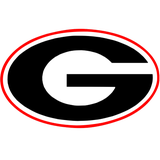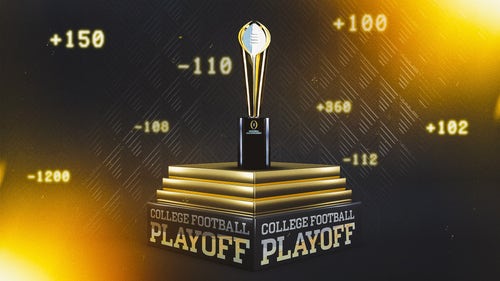
One of the nation's top QBs decommitted from a Big Ten power. What happens next?
When a quarterback backs out of a verbal commitment, there is an immediate, tangible impact: A certain type of relationship is severed. And the reverberations of that QB's decision can be far-reaching.
The basic goal for programs is to acquire the best quarterback possible, typically no more than one per class. A Sports Illustrated study last year showed that signal-callers tend to announce their intentions earlier in a given cycle than other recruits do. A large portion of the best ones are off the board well before the start of their senior high school seasons, and many enroll early to get a jump start on preparing for their first fall of college ball.

Once programs have their guy at quarterback, they can move on to other roster needs, taking comfort that the most important position on the field is settled. But when passers renege on their pledges, those programs have to dip back into what is often a watered-down QB pool. Depending on when the cutting-of-ties happens, there could be few desirable options available. Coaching staffs may be left with no choice but to try to flip signal-callers from other programs.
These breakups also can set off feeding frenzies that shake up programs' recruiting plans. Say one program is pursuing a three-star quarterback with limited upside. Then a local five-star withdraws his commitment from a different program located across the country. The former would be foolish not to change gears, even if the five-star has dozens upon dozens of suitors that enter the fray. However, that program won't be the only one that trains its sights on landing a potential game-changer under center.
There are a lot of interconnected parts, but the main purpose of that prelude was to help put into context the possible rippling effects of recent news involving one of the top quarterback recruits in the class of 2018. Harrison (Ga.) High's Justin Fields, the second-ranked passer in the nation, according to Scout.com, announced in a message released through his Twitter account earlier this month that he was rescinding his vow to Penn State.

Fields initially committed to the Nittany Lions in December. At the time, he was highly regarded as a prospect (18th among QBs in the class of 2018, according to Scout.com), but he's since undergone a rapid ascension up recruiting rankings and is now rated a five-star by every major scouting service. He is universally considered the best dual-threat quarterback in the class, and the only pro-style passer who trumps Fields on any service is Cartersville (Ga.) High's Trevor Lawrence.
Fields is a big-time athlete with the mobility and the arm to stretch opposing defenses to their breaking point. He has been clocked at 4.51 seconds in the 40-yard dash, and he threw for 2,770 yards with 23 touchdowns and six interceptions and added 1,176 yards and 15 scores on the ground as a junior last season. Fields's blend of a big frame (6'3", 221 pounds), an electric dual-threat skill set and residence in the Atlanta metropolitan area have led to him drawing comparisons to former Auburn star and Carolina Panthers starter Cam Newton.
Those traits have shortlisted Fields as a can't-miss recruit in the class of 2018 and turned him into one of the primary targets for a handful of heavyweight programs. A heated competition to secure his services will ensue. This week Fields visited Florida for two days, a trip that followed previous reported stops at Georgia and Auburn as well as Gators in-state rival Florida State. Fields has not publicly provided an update on his thinking since leaving Gainesville, but he addressed reporters at a recent 7-on-7 event.
According to a report from SEC Country, Fields called Florida, Florida State, Auburn and Georgia the “main schools he's focused on” and also mentioned that Alabama, North Carolina and Ole Miss remain involved in his recruitment “a little bit.” He added, according to the report, that the Bulldogs, Gators and Seminoles are “probably [recruiting] the hardest” but conceded that he “honestly do not know where I'm going to go.”

Unless Fields is bluffing, the final remark suggests his decision-making process could drag out until near the start of his senior season at Harrison, if not closer to the newly instituted early signing period in late December. That would provide more time for interested programs to work their way into what's seemingly shaping up as a battle between Southeast schools, although Fields was already being intensely courted by other programs even before renouncing his commitment to Penn State.
The caliber of player and position make Fields's every utterance catnip for recruiting diehards, but another point of intrigue as he gets closer to naming his college destination involves the pursuit of one program: Georgia. The appeal of a union is plain from both sides' perspectives. Fields would immediately attain Big Man On Campus status at his home state's flagship school, and the Bulldogs would leap at the opportunity to bring in a Peach State product with a first-team All-America ceiling. Also, Fields's younger sister, a 2019 softball recruit, has committed to Georgia.
There's more to it than that. Georgia already whiffed on Lawrence, another in-state product who pledged to Clemson in December. And Emory Jones, a four-star out of Heard County (Ga.) High who ranks ninth among QBs in the class of 2018, according to Scout.com, committed to Ohio State last July. The two other four-star passers from Georgia in the class of 2018, Jarren Williams and Cade Fortin, have announced for Kentucky and Texas A&M, respectively.
The Bulldogs are definitely capable of reaching outside state lines for a quarterback in this class, but they better move quickly if forced to go that route, as all but three QBs in the latest Scout 300 have already given verbal pledges. Before Georgia gets to that point, though, it's worth reckoning with the possible fallout of watching the state's top two passers rebuff the Bulldogs in favor of other programs, much less a recruiting rival (Clemson) or division rival (Florida).
For Georgia fans, the pain of missing out on Lawrence and Fields would be irritating on signing day and could become excruciating in the future. The Bulldogs infamously failed to sign Gainesville (Ga.) High's Deshaun Watson, whose lustrous college résumé need not be reviewed in this space. Neither Lawrence nor Fields are likely to match or eclipse what Watson did at Clemson, but the possibility that they could would cast a pall over Georgia's 2018 recruiting efforts, no matter the quality of its class as a whole.

Relief could come from an unlikely source. Matt Corral, rated behind only Lawrence and Fields among 2018 QBs, according to Scout.com, revoked his pledge to USC last week. Taking a wide-angled view of the move, it doesn't make a ton of sense. Corral hails from SoCal powerhouse Long Beach Poly (to which he transferred this off-season after leaving Oaks Christian School in Westlake Village, Calif.), grew up in Trojans territory and spoke in glowing terms about USC in an interview with SI last year.
“They have everything I want, everything I need,” said Corral, who committed to the Trojans last February. “I don't see why else not to go there.” Something apparently changed in a recruitment that, on the surface, felt like a layup for a USC program on the rise under head coach Clay Helton and whose current starting QB is an early candidate to be taken No. 1 in next year's NFL draft. Now not only is Corral no longer verbally tied to USC, he will “no longer consider” the Trojans in the future, according to a report from 247Sports.
Which brings us back to Georgia and Fields. The Bulldogs are one of three programs (the two others are Alabama and Florida) mentioned in that report on Corral as having “separated themselves from the pack,” and Corral visited Athens in April. Los Angeles is a long way from Sanford Stadium, but the distance isn't an insurmountable hurdle. Look no further than the Bulldogs' 2016 recruiting class, in which they pulled a five-star QB prospect, Jacob Eason, from Lake Stevens, Wash., even after a head coaching change (Mark Richt out, Kirby Smart in) late in the cycle.
Adhering strictly to the rankings, if Fields rejects Georgia, there would be no better fallback for the Bulldogs than landing Corral. Regardless, Georgia probably hopes it doesn't have to explore that alternative, even though it's flush with young quarterback talent, having nabbed five-star signal-callers in back-to-back classes (Jake Fromm signed as a member of its 2017 class). A firm commitment from the Cam Newton carbon copy nearby at some point this summer would make things simple. The likelihood that actually happens, however, is up for debate.
The presence of two bluechip underclassmen quarterbacks on Georgia's roster could give Fields pause. Florida, by way of comparison, is set to wage a QB battle this fall between an unproven redshirt freshman (Feleipe Franks), an oft-injured veteran (Luke Del Rio) and a graduate transfer with a skimpy track record (Malik Zaire). According to Land of 10, Fields said this spring, before decommitting from Penn State, that the “most appealing thing” about Florida was its “quarterback room.”

Then there's Florida State, which might present a more attractive package than either Georgia or Florida. The Seminoles do not have a real-deal stud to hand the keys to if redshirt sophomore starter Deondre Francois decides to bolt for the NFL after this season. Plus, Florida State's head coach, Jimbo Fisher, runs a pro-style scheme conducive to grooming passers for the next level, and his status as one of the college game's top quarterback developers is unimpeachable. It doesn't hurt that the Seminoles project as a possible College Football Playoff contender this season.
While the recruiting world waits for Fields to make up his mind, some programs will be stuck in a sort of wobbly holding pattern. Corral is seriously considering both Alabama and Georgia, but a Fields pledge to the Bulldogs might open the door for the Crimson Tide to grab the former USC verbal. Conversely, a Corral commitment to Alabama could compel the Bulldogs to ramp up the pressure on Fields. Those QBs' other suitors would be affected in either scenario, and the Crimson Tide or the Bulldogs also could broaden their searches for a signal-caller depending on what takes place with Fields and Corral.
You don't need to wait for a resolution of the Fields situation to appreciate the repercussions of his choice to open up his recruitment. For a quarterback of Fields's esteem, the simplicity of typing out what amounts to a break-up letter and posting it to a social media account belies the missive's profound influence and the interlocking dynamics of what is taking place in its aftermath. Fields's availability is only part of a complex picture.








